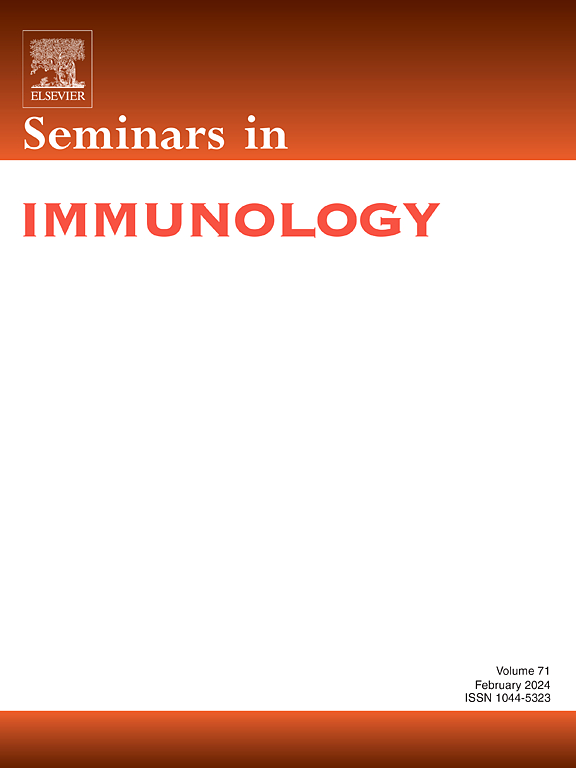肿瘤微环境中补体系统与其他免疫途径的相互作用
IF 7.4
2区 医学
Q1 IMMUNOLOGY
引用次数: 0
摘要
肿瘤的生长和扩散是由肿瘤微环境维持的。炎症细胞和途径在肿瘤微环境中起着重要作用,驱动或调节其他白细胞亚群的功能激活,并有利于逃避抗肿瘤免疫。导致癌症相关炎症的炎症途径之一是补体系统。补体一直被认为是一种与免疫监视相关的免疫机制。最近,由于直接作用于癌细胞或通过骨髓细胞驱动的免疫抑制间接作用,它成为一种促进肿瘤的途径。补体在癌症中的作用是复杂而模糊的,取决于肿瘤的类型和分期,以及其他因素,包括致癌驱动因素、白细胞浸润、与其他肿瘤微环境成分或肿瘤细胞的相互作用。其他复杂因素包括补体分子的来源,其典型或非典型的细胞外功能,其潜在的细胞内激活,以及与其他系统的相互作用,如凝血或微生物组。临床前研究普遍表明,补体激活参与了癌症的阴燃炎症和促进免疫抑制环境。这些研究为旨在增强免疫治疗潜力的临床试验铺平了道路,特别是通过靶向补体依赖性骨髓持续免疫抑制。然而,补体在癌症中的复杂作用和补体参与者的多样性可能是临床试验失败的绊脚石,并表明需要进一步的研究来确定可能从特异性补体分子靶向与常规疗法或免疫疗法联合中受益的患者亚群。在这里,我们将讨论补体激活在癌症中的抗或促肿瘤作用,重点是补体与肿瘤微环境中免疫细胞的相互作用,特别是髓细胞室。此外,我们将研究补体靶向在癌症治疗中的潜力,特别是在巨噬细胞重编程的背景下。本文章由计算机程序翻译,如有差异,请以英文原文为准。
Interplay between the complement system and other immune pathways in the tumor microenvironment
Tumor growth and spread are sustained by the tumor microenvironment. Inflammatory cells and pathways have a fundamental role in the tumor microenvironment, driving or conditioning the functional activation of other leukocyte subsets and favoring evasion of anti-tumor immunity. One of the inflammatory pathways contributing to cancer-related inflammation is the complement system. Complement has long been considered an immune mechanism associated with immunosurveillance. More recently it emerged as a tumor promoting pathway, due to direct effects on cancer cells or indirect effects via immunosuppression driven by myeloid cells. The role of complement in cancer is complex and ambiguous, and depends on the tumor type and stage, as well as other factors including oncogenic drivers, leukocyte infiltration, interactions with other tumor microenvironment components or tumor cells. Other factors of complexity include the source of complement molecules, its canonical or non-canonical extracellular functions, its potential intracellular activation, and the interaction with other systems, such as the coagulation or the microbiome. Preclinical studies generally demonstrate the involvement of complement activation in smouldering inflammation in cancer and promotion of an immunosuppressive environment. These studies paved the way for clinical trials aimed at enhancing the potential of immunotherapy, in particular by targeting complement-dependent myeloid-sustained immunosuppression. However, the complex role of complement in cancer and the multiplicity of complement players may represent stumbling blocks and account for failures of clinical trials, and suggest that further studies are required to identify patient subsets who may benefit from specific complement molecule targeting in combination with conventional therapies or immunotherapy. Here, we will discuss the anti- or pro-tumor role of complement activation in cancer, focusing on the interactions of complement with immune cells within the tumor microenvironment, in particular the myeloid compartment. Furthermore, we will examine the potential of complement targeting in cancer treatment, particularly in the context of macrophage reprogramming.
求助全文
通过发布文献求助,成功后即可免费获取论文全文。
去求助
来源期刊

Seminars in Immunology
医学-免疫学
CiteScore
11.40
自引率
1.30%
发文量
50
审稿时长
89 days
期刊介绍:
Seminars in Immunology is a specialized review journal that serves as a valuable resource for scientists in the field of immunology. The journal's approach is thematic, with each issue dedicated to a specific topic of significant interest to immunologists. It covers a wide range of research areas, from the molecular and cellular foundations of the immune response to the potential for its manipulation, highlighting recent advancements in these areas.
Each thematic issue is curated by a guest editor, who is recognized as an expert in the field internationally. The content of each issue typically includes six to eight authoritative invited reviews, which delve into various aspects of the chosen topic. The goal of these reviews is to provide a comprehensive, coherent, and engaging overview of the subject matter, ensuring that the information is presented in a timely manner to maintain its relevance.
The journal's commitment to quality and timeliness is further supported by its inclusion in the Scopus database, which is a leading abstract and citation database of peer-reviewed literature. Being indexed in Scopus helps to ensure that the journal's content is accessible to a broad audience of researchers and professionals in immunology and related fields.
 求助内容:
求助内容: 应助结果提醒方式:
应助结果提醒方式:


